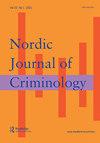Calling the police from the ‘ghetto’: legal consciousness amongst ethnic minority parents
Q2 Social Sciences
引用次数: 1
Abstract
ABSTRACT Ethnic minority communities in Nordic countries are increasingly subject to stereotypical and proactive policing practices. These developments have inspired new research on police-community relations. This article presents findings on police cooperativeness amongst ethnic minority parents residing in a disadvantaged neighbourhood in Denmark, based on qualitative data from a ten-month field study. Taking a ‘critical legal consciousness’ approach, the analysis describes how the parents conceptualize the need to call the police based on their combined evaluation of ‘problematic situations’, expected outcome of involving the police and alternative actions they might take instead of calling the police. Although experiences of negative police encounters were found to be a key factor causing parents to be hesitant to call the police, certain situational factors were found to overrule such experiences and inspired cooperativeness. These are particularly those which parents described as dangerous or as threatening to the wider community. The article discusses whether ethnic minority parents’ willingness to call the police reflects a larger process of internal social distancing between law-abiding residents and a minority of undesirable deviants. The findings have implications for improving police-community relations and provide nuanced insights into the social life of a marginalized community.在“贫民窟”打电话给警察:少数民族父母的法律意识
北欧国家的少数民族社区越来越多地受到刻板印象和前瞻性的警务实践的影响。这些发展激发了对警察与社区关系的新研究。本文基于一项为期10个月的实地研究的定性数据,介绍了居住在丹麦弱势社区的少数民族父母之间警察合作的调查结果。采用“批判性法律意识”的方法,分析描述了父母如何根据他们对“问题情况”的综合评估、涉及警察的预期结果以及他们可能采取的替代行动来概念化报警的必要性。虽然警方的负面遭遇经历被发现是导致父母不愿报警的关键因素,但某些情境因素被发现会压倒这种经历并激发合作。特别是那些被父母描述为危险或对更广泛的社区构成威胁的人。这篇文章讨论了少数族裔父母愿意报警是否反映了守法居民和少数不受欢迎的越轨者之间更大的内部社会距离过程。这些发现对改善警察与社区的关系具有重要意义,并为边缘化社区的社会生活提供了细致入微的见解。
本文章由计算机程序翻译,如有差异,请以英文原文为准。
求助全文
约1分钟内获得全文
求助全文

 求助内容:
求助内容: 应助结果提醒方式:
应助结果提醒方式:


